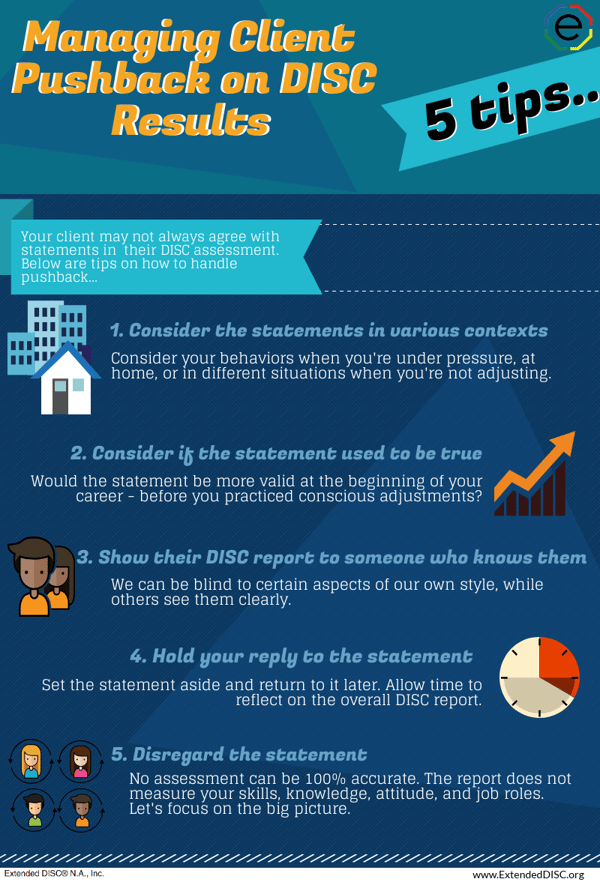How can we best handle client pushback on DISC results?
As coaches and facilitators, you may encounter pushback in your DISC debrief sessions. The pushback may feel like a stressful setback, and a personal reflection of your facilitation or the tool itself. However, look at it as a positive opportunity to build your client's self-awareness and development.
Set the stage
 You have a big advantage in a debrief session because you're talking about the most important person in your clients lives; themselves. Your client, on the other hand, may be a little wary and wonder what it is you're going to reveal about them. So, be prepared, by setting the stage for a successful debrief session before you hand out DISC results. Build it into your pre-game tactics, by setting grounded expectations for clients' results.
You have a big advantage in a debrief session because you're talking about the most important person in your clients lives; themselves. Your client, on the other hand, may be a little wary and wonder what it is you're going to reveal about them. So, be prepared, by setting the stage for a successful debrief session before you hand out DISC results. Build it into your pre-game tactics, by setting grounded expectations for clients' results.
The Extended DISC Assessment is based on the DISC model. It is not a test, but a self-evaluation that measures who you are and who you are not. The DISC model does not judge better or worse, or good or bad.
It doesn't measure intelligence, professional skills, ability, experience, or attitude. A person's success cannot be predicted based on the results. The only thing the tool is designed to predict is your client's behavioral style; simply put, how they prefer to do things.
There are some assessments which only show your strengths, but this is not just a pretty picture report. The report says things about you that are familiar and that you like or accept. However, there are also parts of the report your client may not recognize about themselves and may not even like. These areas may be your client's blind spots.
Remind them, items that we generally agree with tend not to initiate change. We need a compelling reason to change. Strong statements in the report are designed to identify blind spots and illicit change.
This is not me!
 When your client or employee has an objection, it’s imperative that we have the humility to take it seriously. Their needs and opinions come first and it's vital to listen to what they have to say. Their objections and feedback could represent their blind spots and therefore, provide the greatest opportunities to make an impact on their performance.
When your client or employee has an objection, it’s imperative that we have the humility to take it seriously. Their needs and opinions come first and it's vital to listen to what they have to say. Their objections and feedback could represent their blind spots and therefore, provide the greatest opportunities to make an impact on their performance.
Pushback indicates that your client has read the results, but they may need to be reminded it was a self-assessment. You, as their coach, did not answer the questions for them, but of course, we don't say that out loud! Remind them that the report identifies how we see and observe their natural behaviors, even if they do not.
Clients typically pushback on a certain statement in their report, rather than the entire report itself. It's important to listen to their concerns about the statement.
5 tips when faced with push back
 Tip 1 is to consider the statements in various contexts, especially in new situations. The results are a self-identification of their most comfortable ways of doing things and what tends to happen if they do NOT adjust.
Tip 1 is to consider the statements in various contexts, especially in new situations. The results are a self-identification of their most comfortable ways of doing things and what tends to happen if they do NOT adjust.
Tip 2 is to consider if the statements used to be true until they consciously worked on these areas of development. Would the statement be more valid at the beginning of their career before they practiced conscious adjustments? The results do not account for their current role, attitude, or skills, but simply based on their most comfortable ways of doing things.
Tip 3 is to have others they trust provide feedback on the statements. When asking others for feedback it can help them become more aware of their blind spots. Often, we are blind to certain aspects of our own style while others see them clearly.
Tip 4 is to take time to reflect on the entire DISC report. Ask them to set the statement aside and return to it later after having a chance to reflect on the entire report. Some of us have emotional reactions, while others need time to process.
Tip 5 is to focus on the big picture. If your client continues to disagree simply say, “I believe you." They know themselves better than anyone. Ask if they can disregard the statement and focus on the big picture. Do they agree with the strengths in their report? There's a good chance they agree with the majority of the report. No assessment can provide 100 percent accurate statements every time. The overall goal is to make small changes in behaviors to have a big impact.
Practice what you coach
 Have you ever had a session where someone says, "this is not me" or "I don't agree with this statement"? This is an example of pushback. First, and probably the most important, thing to remember, is to breathe. Don't go into panic mode. Remember, remove the emotions and separate yourself; they answered their own questions. It's not personal, so stay centered and focused on their concerns.
Have you ever had a session where someone says, "this is not me" or "I don't agree with this statement"? This is an example of pushback. First, and probably the most important, thing to remember, is to breathe. Don't go into panic mode. Remember, remove the emotions and separate yourself; they answered their own questions. It's not personal, so stay centered and focused on their concerns.
We view the world through our own lenses. People are different; how we process feedback and how we react to our results will all depend on who we are. Secondly, remember your own style and how it impacts the interactions with your clients. How do you show up? Take a moment and reflect on your own self-awareness as a coach. Thirdly, identify who you're working with and keep in mind the other person’s style.
Lastly, remember to adjust your own style! The debriefing is a two-way street. It's a give and take. Continue to make adjustments throughout the session, knowing your client is as well.
Breathe and listen like you mean it.

